Internet Gambling: Growth, Regulation, and Harm Minimization Report
VerifiedAdded on 2020/05/16
|7
|2505
|189
Report
AI Summary
This report provides a comprehensive overview of the burgeoning internet gambling industry, examining its rapid expansion in recent years, driven by factors such as increased internet penetration, the proliferation of broadband connections, and the convenience of online platforms. It highlights the diverse range of gambling activities available online, including poker, casino games, and sports betting, and discusses the industry's global presence, with a particular focus on the regulatory landscape and the challenges posed by the industry. The report further explores the complexities of regulating online gambling, the concerns surrounding harm minimization, and the efforts of governments, including Singapore, to address the ethical, social, and criminal implications associated with this evolving industry. It also addresses the challenges in controlling online gambling, especially due to its global nature and the emergence of new technologies, while emphasizing the importance of balanced regulatory approaches that consider both economic benefits and potential societal harms.
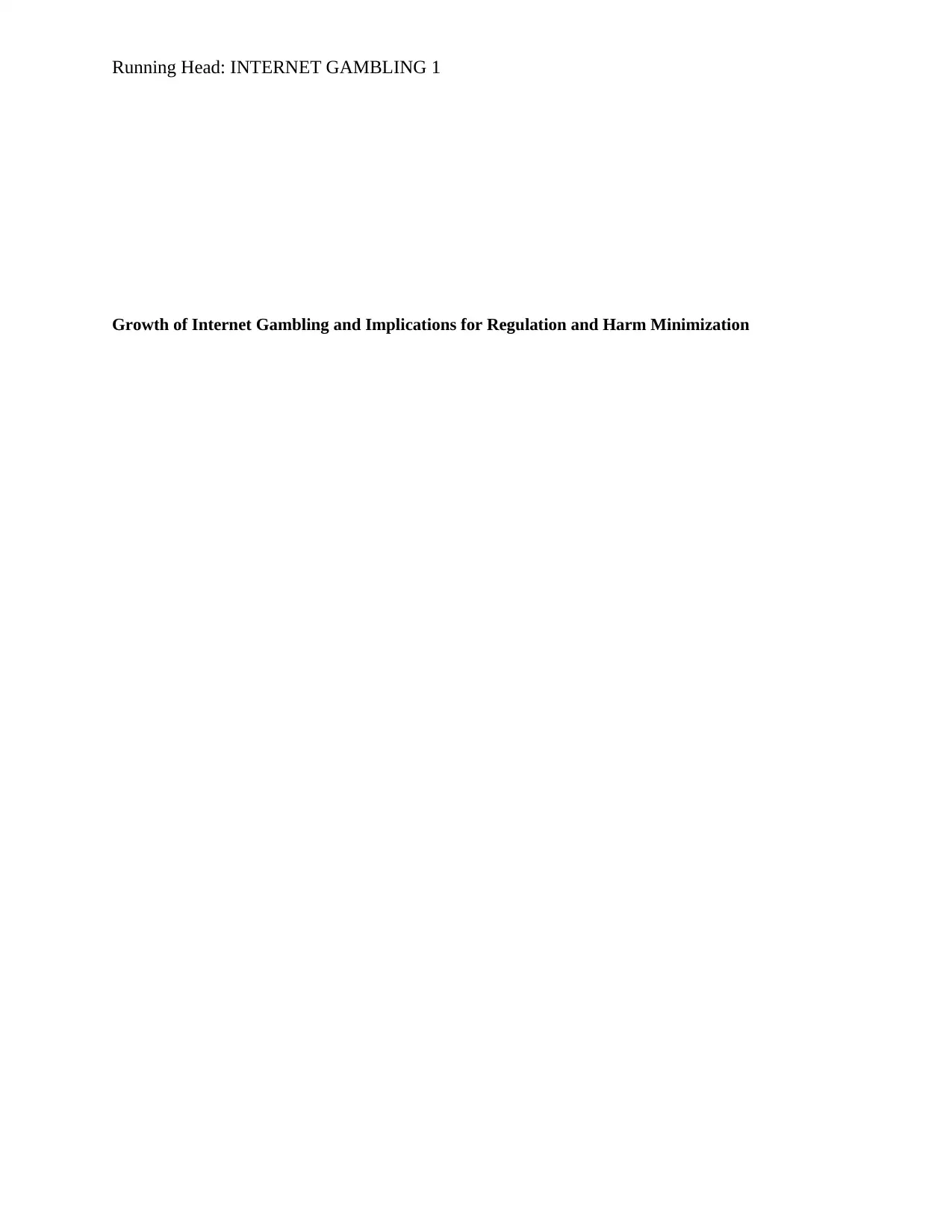
Running Head: INTERNET GAMBLING 1
Growth of Internet Gambling and Implications for Regulation and Harm Minimization
Growth of Internet Gambling and Implications for Regulation and Harm Minimization
Paraphrase This Document
Need a fresh take? Get an instant paraphrase of this document with our AI Paraphraser
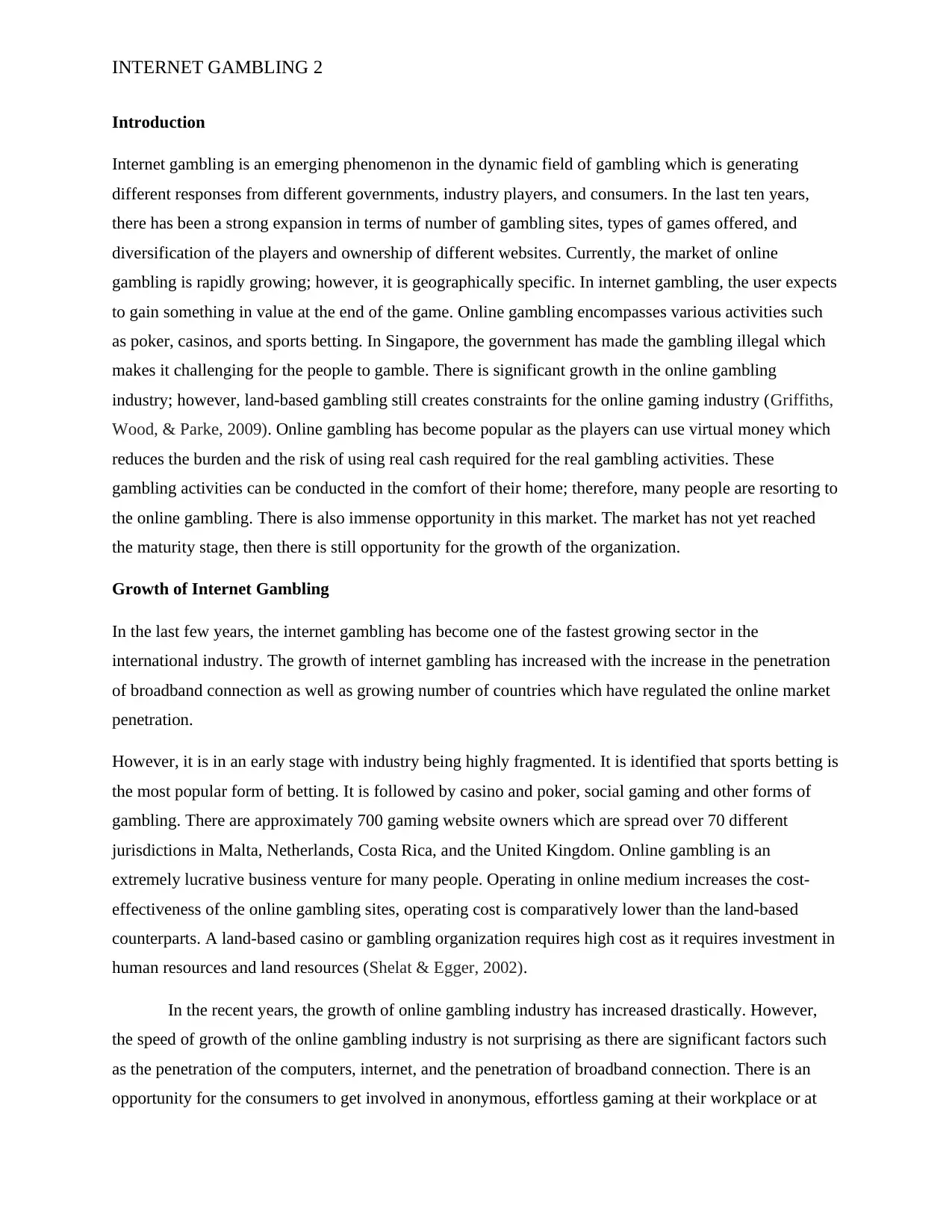
INTERNET GAMBLING 2
Introduction
Internet gambling is an emerging phenomenon in the dynamic field of gambling which is generating
different responses from different governments, industry players, and consumers. In the last ten years,
there has been a strong expansion in terms of number of gambling sites, types of games offered, and
diversification of the players and ownership of different websites. Currently, the market of online
gambling is rapidly growing; however, it is geographically specific. In internet gambling, the user expects
to gain something in value at the end of the game. Online gambling encompasses various activities such
as poker, casinos, and sports betting. In Singapore, the government has made the gambling illegal which
makes it challenging for the people to gamble. There is significant growth in the online gambling
industry; however, land-based gambling still creates constraints for the online gaming industry (Griffiths,
Wood, & Parke, 2009). Online gambling has become popular as the players can use virtual money which
reduces the burden and the risk of using real cash required for the real gambling activities. These
gambling activities can be conducted in the comfort of their home; therefore, many people are resorting to
the online gambling. There is also immense opportunity in this market. The market has not yet reached
the maturity stage, then there is still opportunity for the growth of the organization.
Growth of Internet Gambling
In the last few years, the internet gambling has become one of the fastest growing sector in the
international industry. The growth of internet gambling has increased with the increase in the penetration
of broadband connection as well as growing number of countries which have regulated the online market
penetration.
However, it is in an early stage with industry being highly fragmented. It is identified that sports betting is
the most popular form of betting. It is followed by casino and poker, social gaming and other forms of
gambling. There are approximately 700 gaming website owners which are spread over 70 different
jurisdictions in Malta, Netherlands, Costa Rica, and the United Kingdom. Online gambling is an
extremely lucrative business venture for many people. Operating in online medium increases the cost-
effectiveness of the online gambling sites, operating cost is comparatively lower than the land-based
counterparts. A land-based casino or gambling organization requires high cost as it requires investment in
human resources and land resources (Shelat & Egger, 2002).
In the recent years, the growth of online gambling industry has increased drastically. However,
the speed of growth of the online gambling industry is not surprising as there are significant factors such
as the penetration of the computers, internet, and the penetration of broadband connection. There is an
opportunity for the consumers to get involved in anonymous, effortless gaming at their workplace or at
Introduction
Internet gambling is an emerging phenomenon in the dynamic field of gambling which is generating
different responses from different governments, industry players, and consumers. In the last ten years,
there has been a strong expansion in terms of number of gambling sites, types of games offered, and
diversification of the players and ownership of different websites. Currently, the market of online
gambling is rapidly growing; however, it is geographically specific. In internet gambling, the user expects
to gain something in value at the end of the game. Online gambling encompasses various activities such
as poker, casinos, and sports betting. In Singapore, the government has made the gambling illegal which
makes it challenging for the people to gamble. There is significant growth in the online gambling
industry; however, land-based gambling still creates constraints for the online gaming industry (Griffiths,
Wood, & Parke, 2009). Online gambling has become popular as the players can use virtual money which
reduces the burden and the risk of using real cash required for the real gambling activities. These
gambling activities can be conducted in the comfort of their home; therefore, many people are resorting to
the online gambling. There is also immense opportunity in this market. The market has not yet reached
the maturity stage, then there is still opportunity for the growth of the organization.
Growth of Internet Gambling
In the last few years, the internet gambling has become one of the fastest growing sector in the
international industry. The growth of internet gambling has increased with the increase in the penetration
of broadband connection as well as growing number of countries which have regulated the online market
penetration.
However, it is in an early stage with industry being highly fragmented. It is identified that sports betting is
the most popular form of betting. It is followed by casino and poker, social gaming and other forms of
gambling. There are approximately 700 gaming website owners which are spread over 70 different
jurisdictions in Malta, Netherlands, Costa Rica, and the United Kingdom. Online gambling is an
extremely lucrative business venture for many people. Operating in online medium increases the cost-
effectiveness of the online gambling sites, operating cost is comparatively lower than the land-based
counterparts. A land-based casino or gambling organization requires high cost as it requires investment in
human resources and land resources (Shelat & Egger, 2002).
In the recent years, the growth of online gambling industry has increased drastically. However,
the speed of growth of the online gambling industry is not surprising as there are significant factors such
as the penetration of the computers, internet, and the penetration of broadband connection. There is an
opportunity for the consumers to get involved in anonymous, effortless gaming at their workplace or at
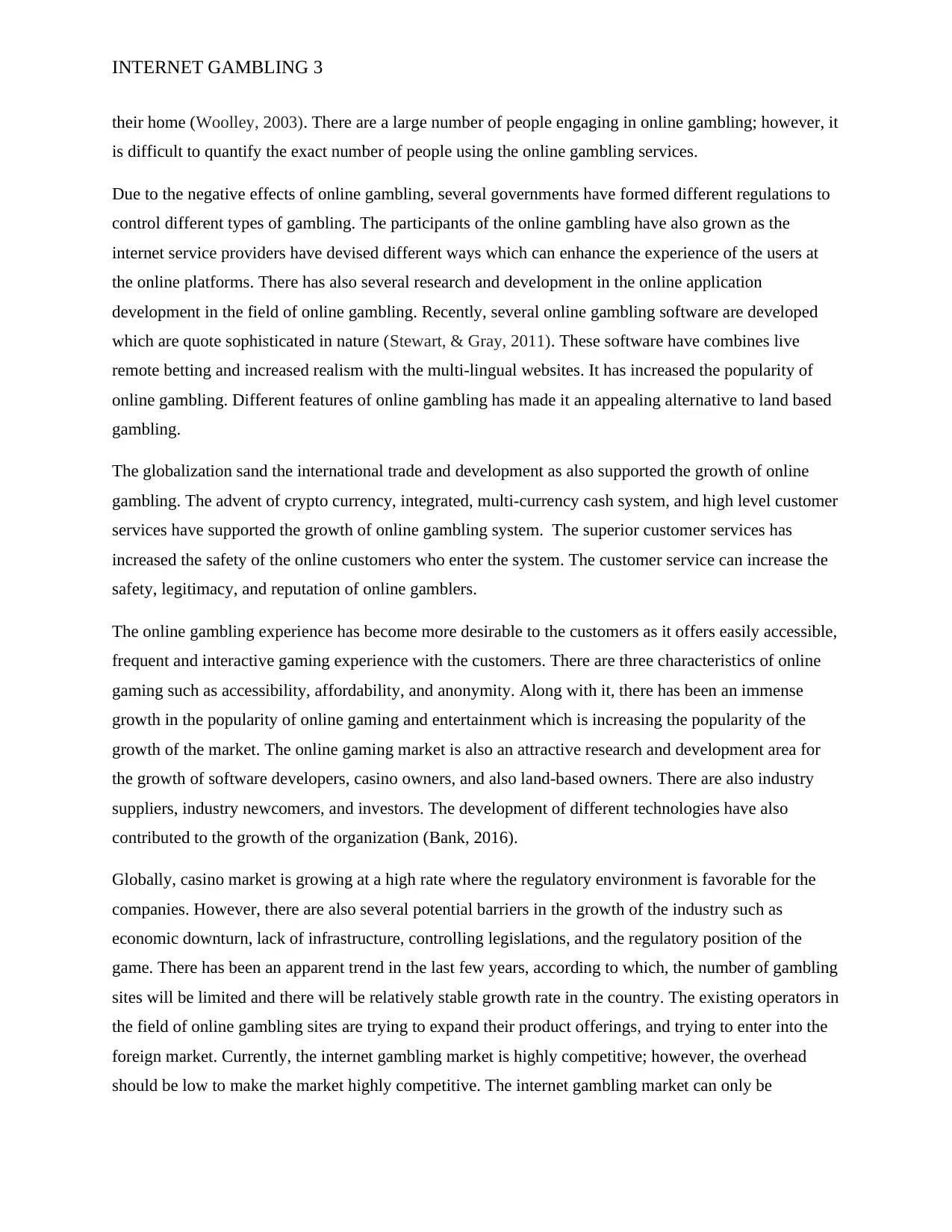
INTERNET GAMBLING 3
their home (Woolley, 2003). There are a large number of people engaging in online gambling; however, it
is difficult to quantify the exact number of people using the online gambling services.
Due to the negative effects of online gambling, several governments have formed different regulations to
control different types of gambling. The participants of the online gambling have also grown as the
internet service providers have devised different ways which can enhance the experience of the users at
the online platforms. There has also several research and development in the online application
development in the field of online gambling. Recently, several online gambling software are developed
which are quote sophisticated in nature (Stewart, & Gray, 2011). These software have combines live
remote betting and increased realism with the multi-lingual websites. It has increased the popularity of
online gambling. Different features of online gambling has made it an appealing alternative to land based
gambling.
The globalization sand the international trade and development as also supported the growth of online
gambling. The advent of crypto currency, integrated, multi-currency cash system, and high level customer
services have supported the growth of online gambling system. The superior customer services has
increased the safety of the online customers who enter the system. The customer service can increase the
safety, legitimacy, and reputation of online gamblers.
The online gambling experience has become more desirable to the customers as it offers easily accessible,
frequent and interactive gaming experience with the customers. There are three characteristics of online
gaming such as accessibility, affordability, and anonymity. Along with it, there has been an immense
growth in the popularity of online gaming and entertainment which is increasing the popularity of the
growth of the market. The online gaming market is also an attractive research and development area for
the growth of software developers, casino owners, and also land-based owners. There are also industry
suppliers, industry newcomers, and investors. The development of different technologies have also
contributed to the growth of the organization (Bank, 2016).
Globally, casino market is growing at a high rate where the regulatory environment is favorable for the
companies. However, there are also several potential barriers in the growth of the industry such as
economic downturn, lack of infrastructure, controlling legislations, and the regulatory position of the
game. There has been an apparent trend in the last few years, according to which, the number of gambling
sites will be limited and there will be relatively stable growth rate in the country. The existing operators in
the field of online gambling sites are trying to expand their product offerings, and trying to enter into the
foreign market. Currently, the internet gambling market is highly competitive; however, the overhead
should be low to make the market highly competitive. The internet gambling market can only be
their home (Woolley, 2003). There are a large number of people engaging in online gambling; however, it
is difficult to quantify the exact number of people using the online gambling services.
Due to the negative effects of online gambling, several governments have formed different regulations to
control different types of gambling. The participants of the online gambling have also grown as the
internet service providers have devised different ways which can enhance the experience of the users at
the online platforms. There has also several research and development in the online application
development in the field of online gambling. Recently, several online gambling software are developed
which are quote sophisticated in nature (Stewart, & Gray, 2011). These software have combines live
remote betting and increased realism with the multi-lingual websites. It has increased the popularity of
online gambling. Different features of online gambling has made it an appealing alternative to land based
gambling.
The globalization sand the international trade and development as also supported the growth of online
gambling. The advent of crypto currency, integrated, multi-currency cash system, and high level customer
services have supported the growth of online gambling system. The superior customer services has
increased the safety of the online customers who enter the system. The customer service can increase the
safety, legitimacy, and reputation of online gamblers.
The online gambling experience has become more desirable to the customers as it offers easily accessible,
frequent and interactive gaming experience with the customers. There are three characteristics of online
gaming such as accessibility, affordability, and anonymity. Along with it, there has been an immense
growth in the popularity of online gaming and entertainment which is increasing the popularity of the
growth of the market. The online gaming market is also an attractive research and development area for
the growth of software developers, casino owners, and also land-based owners. There are also industry
suppliers, industry newcomers, and investors. The development of different technologies have also
contributed to the growth of the organization (Bank, 2016).
Globally, casino market is growing at a high rate where the regulatory environment is favorable for the
companies. However, there are also several potential barriers in the growth of the industry such as
economic downturn, lack of infrastructure, controlling legislations, and the regulatory position of the
game. There has been an apparent trend in the last few years, according to which, the number of gambling
sites will be limited and there will be relatively stable growth rate in the country. The existing operators in
the field of online gambling sites are trying to expand their product offerings, and trying to enter into the
foreign market. Currently, the internet gambling market is highly competitive; however, the overhead
should be low to make the market highly competitive. The internet gambling market can only be
⊘ This is a preview!⊘
Do you want full access?
Subscribe today to unlock all pages.

Trusted by 1+ million students worldwide
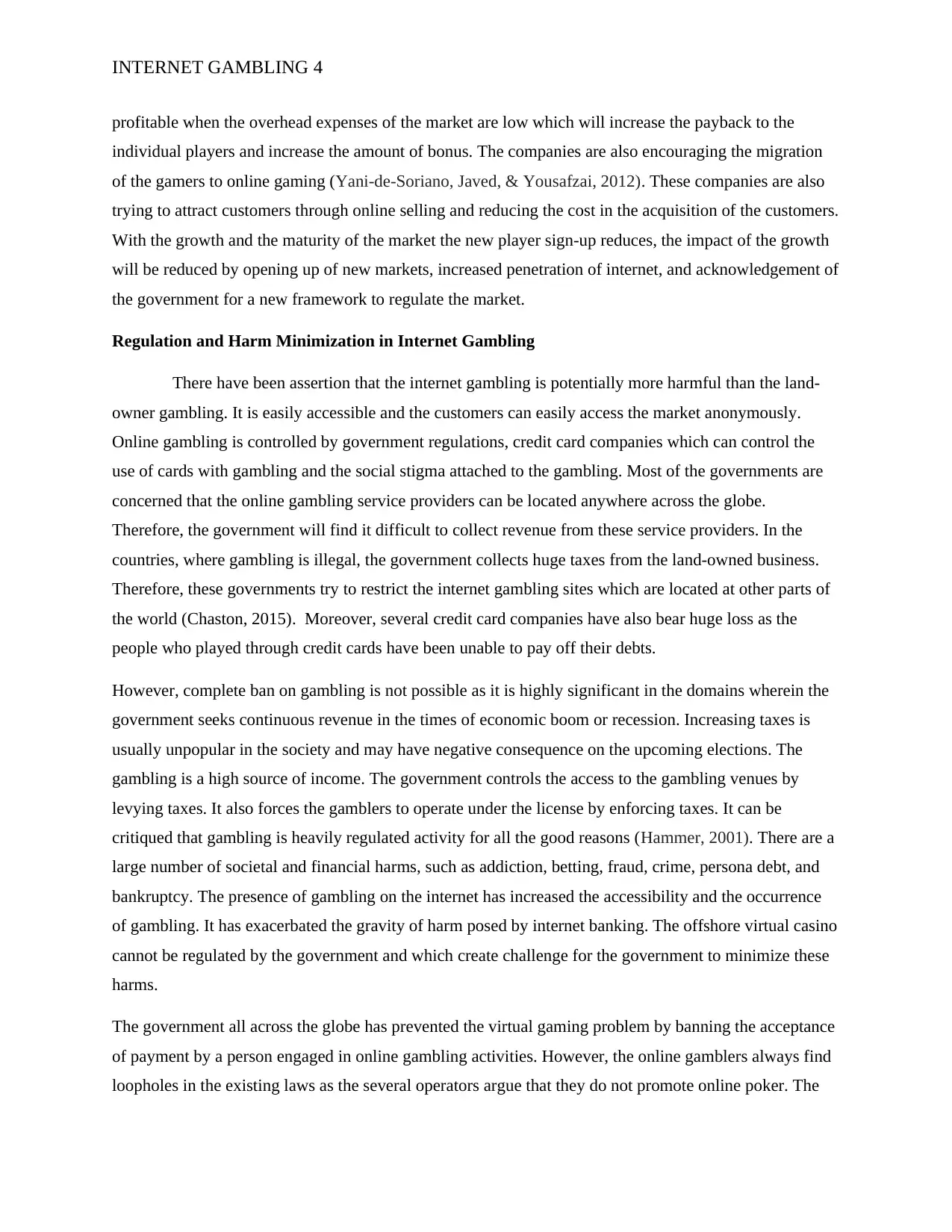
INTERNET GAMBLING 4
profitable when the overhead expenses of the market are low which will increase the payback to the
individual players and increase the amount of bonus. The companies are also encouraging the migration
of the gamers to online gaming (Yani-de-Soriano, Javed, & Yousafzai, 2012). These companies are also
trying to attract customers through online selling and reducing the cost in the acquisition of the customers.
With the growth and the maturity of the market the new player sign-up reduces, the impact of the growth
will be reduced by opening up of new markets, increased penetration of internet, and acknowledgement of
the government for a new framework to regulate the market.
Regulation and Harm Minimization in Internet Gambling
There have been assertion that the internet gambling is potentially more harmful than the land-
owner gambling. It is easily accessible and the customers can easily access the market anonymously.
Online gambling is controlled by government regulations, credit card companies which can control the
use of cards with gambling and the social stigma attached to the gambling. Most of the governments are
concerned that the online gambling service providers can be located anywhere across the globe.
Therefore, the government will find it difficult to collect revenue from these service providers. In the
countries, where gambling is illegal, the government collects huge taxes from the land-owned business.
Therefore, these governments try to restrict the internet gambling sites which are located at other parts of
the world (Chaston, 2015). Moreover, several credit card companies have also bear huge loss as the
people who played through credit cards have been unable to pay off their debts.
However, complete ban on gambling is not possible as it is highly significant in the domains wherein the
government seeks continuous revenue in the times of economic boom or recession. Increasing taxes is
usually unpopular in the society and may have negative consequence on the upcoming elections. The
gambling is a high source of income. The government controls the access to the gambling venues by
levying taxes. It also forces the gamblers to operate under the license by enforcing taxes. It can be
critiqued that gambling is heavily regulated activity for all the good reasons (Hammer, 2001). There are a
large number of societal and financial harms, such as addiction, betting, fraud, crime, persona debt, and
bankruptcy. The presence of gambling on the internet has increased the accessibility and the occurrence
of gambling. It has exacerbated the gravity of harm posed by internet banking. The offshore virtual casino
cannot be regulated by the government and which create challenge for the government to minimize these
harms.
The government all across the globe has prevented the virtual gaming problem by banning the acceptance
of payment by a person engaged in online gambling activities. However, the online gamblers always find
loopholes in the existing laws as the several operators argue that they do not promote online poker. The
profitable when the overhead expenses of the market are low which will increase the payback to the
individual players and increase the amount of bonus. The companies are also encouraging the migration
of the gamers to online gaming (Yani-de-Soriano, Javed, & Yousafzai, 2012). These companies are also
trying to attract customers through online selling and reducing the cost in the acquisition of the customers.
With the growth and the maturity of the market the new player sign-up reduces, the impact of the growth
will be reduced by opening up of new markets, increased penetration of internet, and acknowledgement of
the government for a new framework to regulate the market.
Regulation and Harm Minimization in Internet Gambling
There have been assertion that the internet gambling is potentially more harmful than the land-
owner gambling. It is easily accessible and the customers can easily access the market anonymously.
Online gambling is controlled by government regulations, credit card companies which can control the
use of cards with gambling and the social stigma attached to the gambling. Most of the governments are
concerned that the online gambling service providers can be located anywhere across the globe.
Therefore, the government will find it difficult to collect revenue from these service providers. In the
countries, where gambling is illegal, the government collects huge taxes from the land-owned business.
Therefore, these governments try to restrict the internet gambling sites which are located at other parts of
the world (Chaston, 2015). Moreover, several credit card companies have also bear huge loss as the
people who played through credit cards have been unable to pay off their debts.
However, complete ban on gambling is not possible as it is highly significant in the domains wherein the
government seeks continuous revenue in the times of economic boom or recession. Increasing taxes is
usually unpopular in the society and may have negative consequence on the upcoming elections. The
gambling is a high source of income. The government controls the access to the gambling venues by
levying taxes. It also forces the gamblers to operate under the license by enforcing taxes. It can be
critiqued that gambling is heavily regulated activity for all the good reasons (Hammer, 2001). There are a
large number of societal and financial harms, such as addiction, betting, fraud, crime, persona debt, and
bankruptcy. The presence of gambling on the internet has increased the accessibility and the occurrence
of gambling. It has exacerbated the gravity of harm posed by internet banking. The offshore virtual casino
cannot be regulated by the government and which create challenge for the government to minimize these
harms.
The government all across the globe has prevented the virtual gaming problem by banning the acceptance
of payment by a person engaged in online gambling activities. However, the online gamblers always find
loopholes in the existing laws as the several operators argue that they do not promote online poker. The
Paraphrase This Document
Need a fresh take? Get an instant paraphrase of this document with our AI Paraphraser
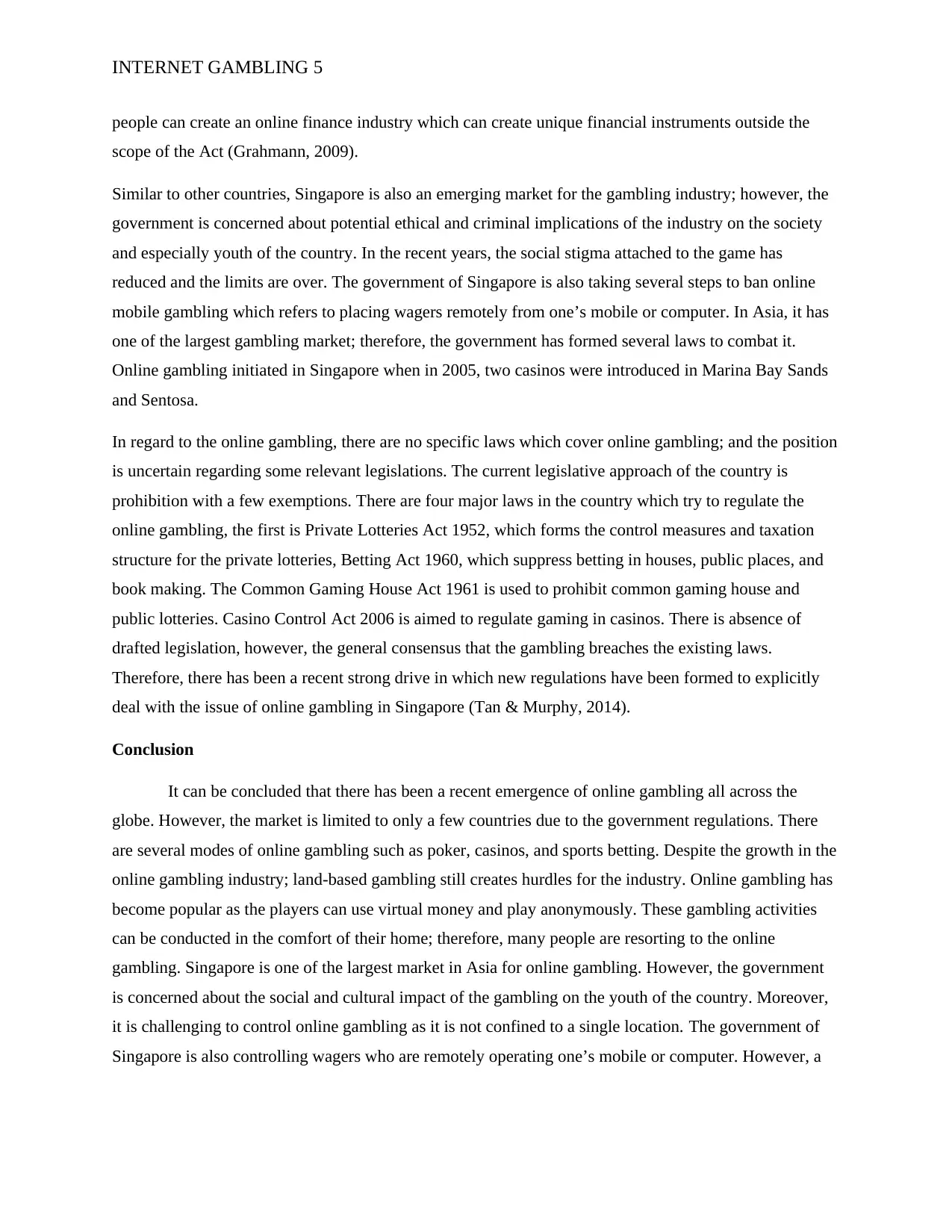
INTERNET GAMBLING 5
people can create an online finance industry which can create unique financial instruments outside the
scope of the Act (Grahmann, 2009).
Similar to other countries, Singapore is also an emerging market for the gambling industry; however, the
government is concerned about potential ethical and criminal implications of the industry on the society
and especially youth of the country. In the recent years, the social stigma attached to the game has
reduced and the limits are over. The government of Singapore is also taking several steps to ban online
mobile gambling which refers to placing wagers remotely from one’s mobile or computer. In Asia, it has
one of the largest gambling market; therefore, the government has formed several laws to combat it.
Online gambling initiated in Singapore when in 2005, two casinos were introduced in Marina Bay Sands
and Sentosa.
In regard to the online gambling, there are no specific laws which cover online gambling; and the position
is uncertain regarding some relevant legislations. The current legislative approach of the country is
prohibition with a few exemptions. There are four major laws in the country which try to regulate the
online gambling, the first is Private Lotteries Act 1952, which forms the control measures and taxation
structure for the private lotteries, Betting Act 1960, which suppress betting in houses, public places, and
book making. The Common Gaming House Act 1961 is used to prohibit common gaming house and
public lotteries. Casino Control Act 2006 is aimed to regulate gaming in casinos. There is absence of
drafted legislation, however, the general consensus that the gambling breaches the existing laws.
Therefore, there has been a recent strong drive in which new regulations have been formed to explicitly
deal with the issue of online gambling in Singapore (Tan & Murphy, 2014).
Conclusion
It can be concluded that there has been a recent emergence of online gambling all across the
globe. However, the market is limited to only a few countries due to the government regulations. There
are several modes of online gambling such as poker, casinos, and sports betting. Despite the growth in the
online gambling industry; land-based gambling still creates hurdles for the industry. Online gambling has
become popular as the players can use virtual money and play anonymously. These gambling activities
can be conducted in the comfort of their home; therefore, many people are resorting to the online
gambling. Singapore is one of the largest market in Asia for online gambling. However, the government
is concerned about the social and cultural impact of the gambling on the youth of the country. Moreover,
it is challenging to control online gambling as it is not confined to a single location. The government of
Singapore is also controlling wagers who are remotely operating one’s mobile or computer. However, a
people can create an online finance industry which can create unique financial instruments outside the
scope of the Act (Grahmann, 2009).
Similar to other countries, Singapore is also an emerging market for the gambling industry; however, the
government is concerned about potential ethical and criminal implications of the industry on the society
and especially youth of the country. In the recent years, the social stigma attached to the game has
reduced and the limits are over. The government of Singapore is also taking several steps to ban online
mobile gambling which refers to placing wagers remotely from one’s mobile or computer. In Asia, it has
one of the largest gambling market; therefore, the government has formed several laws to combat it.
Online gambling initiated in Singapore when in 2005, two casinos were introduced in Marina Bay Sands
and Sentosa.
In regard to the online gambling, there are no specific laws which cover online gambling; and the position
is uncertain regarding some relevant legislations. The current legislative approach of the country is
prohibition with a few exemptions. There are four major laws in the country which try to regulate the
online gambling, the first is Private Lotteries Act 1952, which forms the control measures and taxation
structure for the private lotteries, Betting Act 1960, which suppress betting in houses, public places, and
book making. The Common Gaming House Act 1961 is used to prohibit common gaming house and
public lotteries. Casino Control Act 2006 is aimed to regulate gaming in casinos. There is absence of
drafted legislation, however, the general consensus that the gambling breaches the existing laws.
Therefore, there has been a recent strong drive in which new regulations have been formed to explicitly
deal with the issue of online gambling in Singapore (Tan & Murphy, 2014).
Conclusion
It can be concluded that there has been a recent emergence of online gambling all across the
globe. However, the market is limited to only a few countries due to the government regulations. There
are several modes of online gambling such as poker, casinos, and sports betting. Despite the growth in the
online gambling industry; land-based gambling still creates hurdles for the industry. Online gambling has
become popular as the players can use virtual money and play anonymously. These gambling activities
can be conducted in the comfort of their home; therefore, many people are resorting to the online
gambling. Singapore is one of the largest market in Asia for online gambling. However, the government
is concerned about the social and cultural impact of the gambling on the youth of the country. Moreover,
it is challenging to control online gambling as it is not confined to a single location. The government of
Singapore is also controlling wagers who are remotely operating one’s mobile or computer. However, a

INTERNET GAMBLING 6
complete ban on the industry is challenging as it is a good source of income for the governments in
economic boom or recession.
complete ban on the industry is challenging as it is a good source of income for the governments in
economic boom or recession.
⊘ This is a preview!⊘
Do you want full access?
Subscribe today to unlock all pages.

Trusted by 1+ million students worldwide
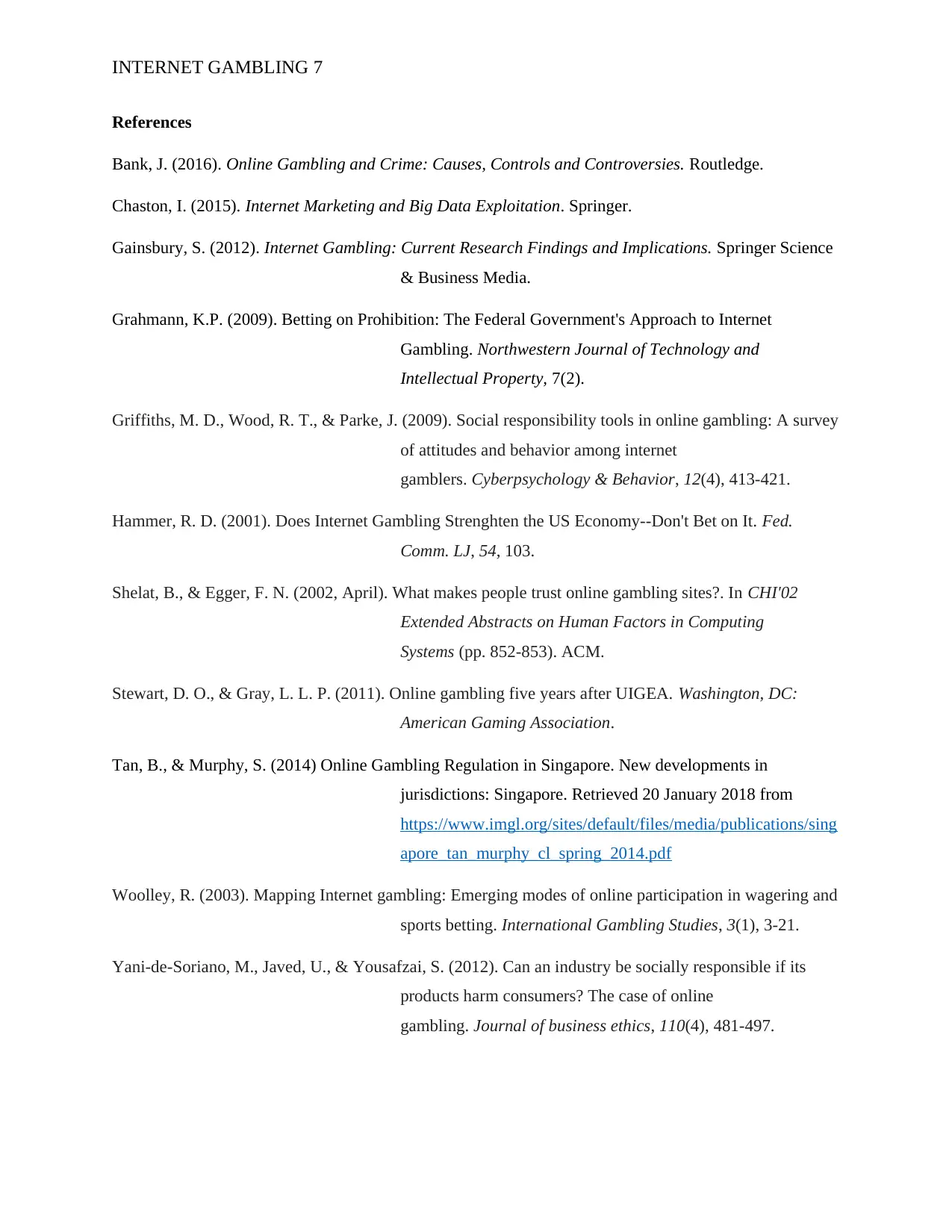
INTERNET GAMBLING 7
References
Bank, J. (2016). Online Gambling and Crime: Causes, Controls and Controversies. Routledge.
Chaston, I. (2015). Internet Marketing and Big Data Exploitation. Springer.
Gainsbury, S. (2012). Internet Gambling: Current Research Findings and Implications. Springer Science
& Business Media.
Grahmann, K.P. (2009). Betting on Prohibition: The Federal Government's Approach to Internet
Gambling. Northwestern Journal of Technology and
Intellectual Property, 7(2).
Griffiths, M. D., Wood, R. T., & Parke, J. (2009). Social responsibility tools in online gambling: A survey
of attitudes and behavior among internet
gamblers. Cyberpsychology & Behavior, 12(4), 413-421.
Hammer, R. D. (2001). Does Internet Gambling Strenghten the US Economy--Don't Bet on It. Fed.
Comm. LJ, 54, 103.
Shelat, B., & Egger, F. N. (2002, April). What makes people trust online gambling sites?. In CHI'02
Extended Abstracts on Human Factors in Computing
Systems (pp. 852-853). ACM.
Stewart, D. O., & Gray, L. L. P. (2011). Online gambling five years after UIGEA. Washington, DC:
American Gaming Association.
Tan, B., & Murphy, S. (2014) Online Gambling Regulation in Singapore. New developments in
jurisdictions: Singapore. Retrieved 20 January 2018 from
https://www.imgl.org/sites/default/files/media/publications/sing
apore_tan_murphy_cl_spring_2014.pdf
Woolley, R. (2003). Mapping Internet gambling: Emerging modes of online participation in wagering and
sports betting. International Gambling Studies, 3(1), 3-21.
Yani-de-Soriano, M., Javed, U., & Yousafzai, S. (2012). Can an industry be socially responsible if its
products harm consumers? The case of online
gambling. Journal of business ethics, 110(4), 481-497.
References
Bank, J. (2016). Online Gambling and Crime: Causes, Controls and Controversies. Routledge.
Chaston, I. (2015). Internet Marketing and Big Data Exploitation. Springer.
Gainsbury, S. (2012). Internet Gambling: Current Research Findings and Implications. Springer Science
& Business Media.
Grahmann, K.P. (2009). Betting on Prohibition: The Federal Government's Approach to Internet
Gambling. Northwestern Journal of Technology and
Intellectual Property, 7(2).
Griffiths, M. D., Wood, R. T., & Parke, J. (2009). Social responsibility tools in online gambling: A survey
of attitudes and behavior among internet
gamblers. Cyberpsychology & Behavior, 12(4), 413-421.
Hammer, R. D. (2001). Does Internet Gambling Strenghten the US Economy--Don't Bet on It. Fed.
Comm. LJ, 54, 103.
Shelat, B., & Egger, F. N. (2002, April). What makes people trust online gambling sites?. In CHI'02
Extended Abstracts on Human Factors in Computing
Systems (pp. 852-853). ACM.
Stewart, D. O., & Gray, L. L. P. (2011). Online gambling five years after UIGEA. Washington, DC:
American Gaming Association.
Tan, B., & Murphy, S. (2014) Online Gambling Regulation in Singapore. New developments in
jurisdictions: Singapore. Retrieved 20 January 2018 from
https://www.imgl.org/sites/default/files/media/publications/sing
apore_tan_murphy_cl_spring_2014.pdf
Woolley, R. (2003). Mapping Internet gambling: Emerging modes of online participation in wagering and
sports betting. International Gambling Studies, 3(1), 3-21.
Yani-de-Soriano, M., Javed, U., & Yousafzai, S. (2012). Can an industry be socially responsible if its
products harm consumers? The case of online
gambling. Journal of business ethics, 110(4), 481-497.
1 out of 7
Related Documents
Your All-in-One AI-Powered Toolkit for Academic Success.
+13062052269
info@desklib.com
Available 24*7 on WhatsApp / Email
![[object Object]](/_next/static/media/star-bottom.7253800d.svg)
Unlock your academic potential
Copyright © 2020–2026 A2Z Services. All Rights Reserved. Developed and managed by ZUCOL.





